1. The fused (blended) composition of the s-c.

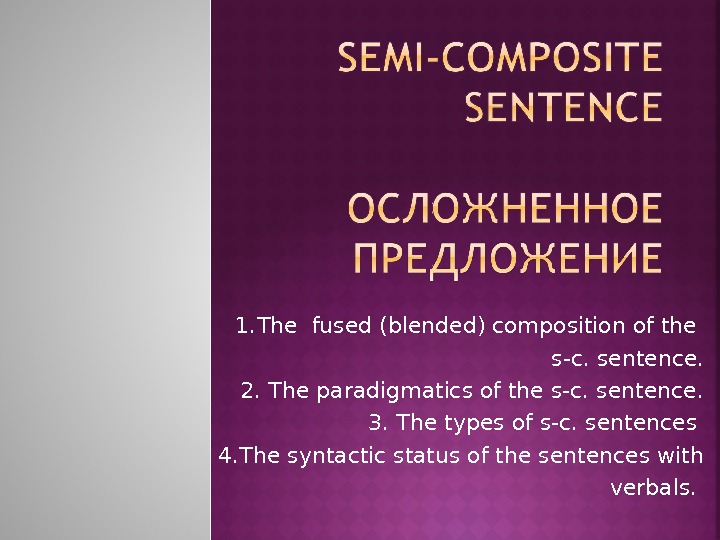
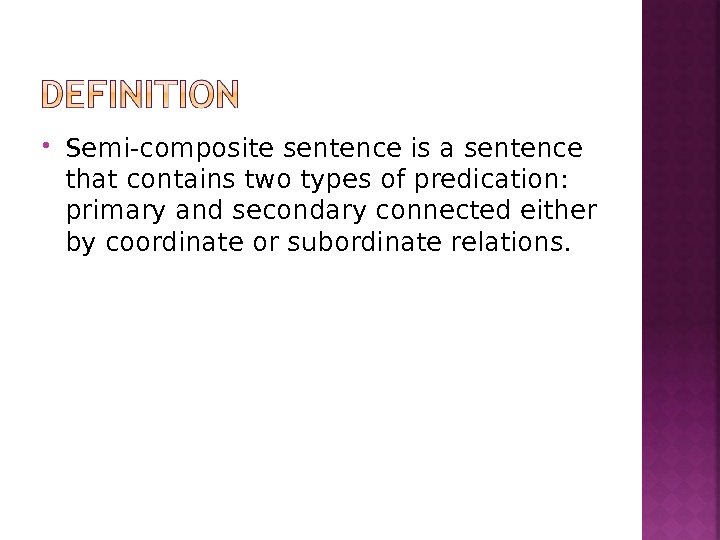
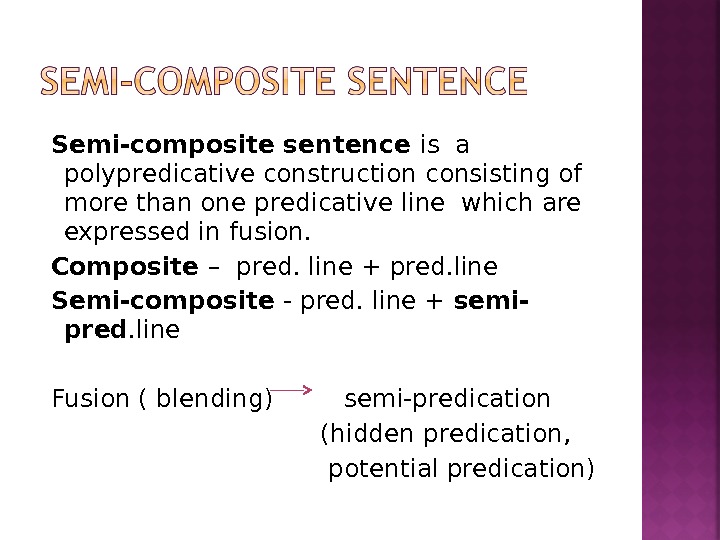
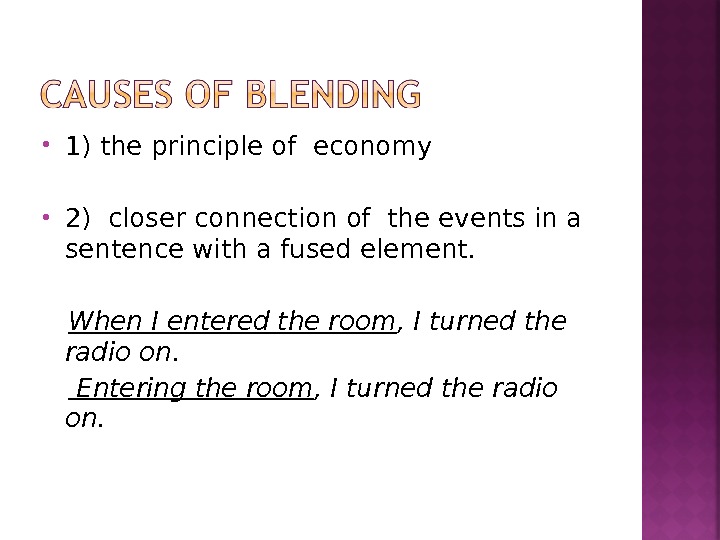
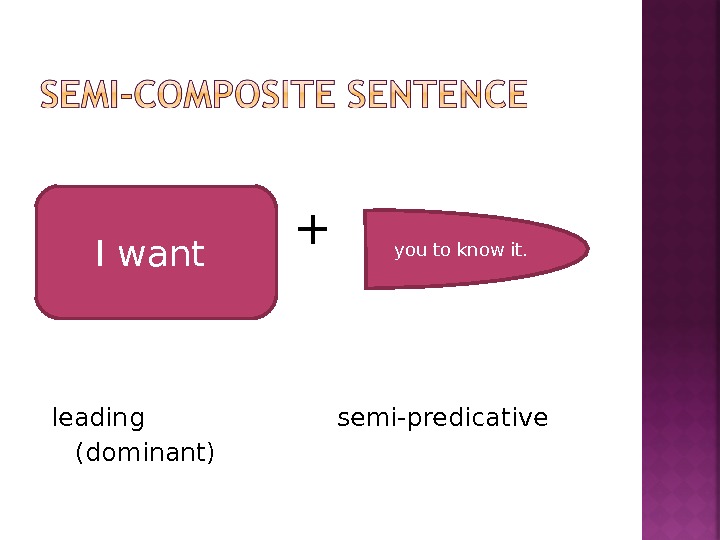
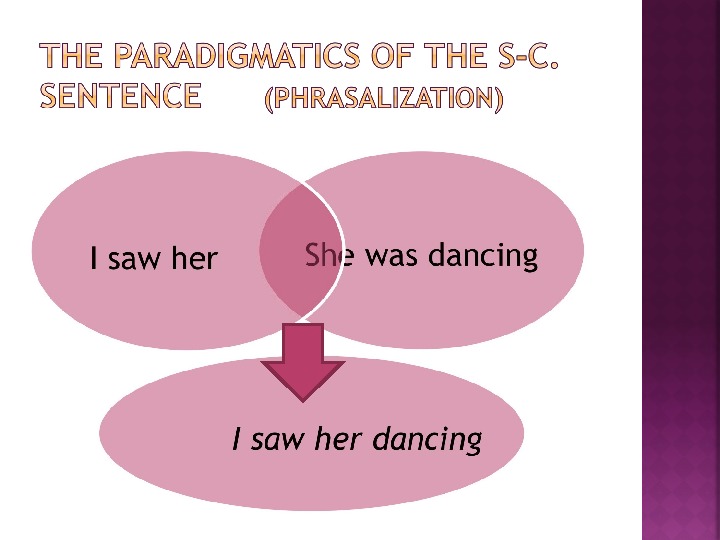
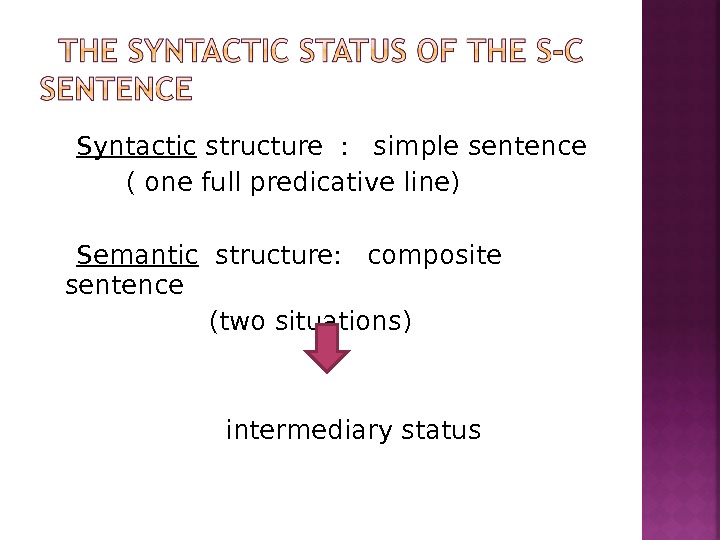
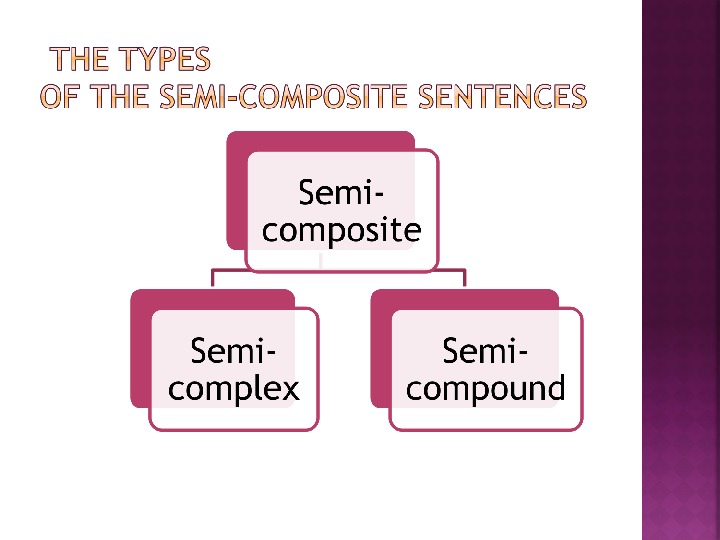
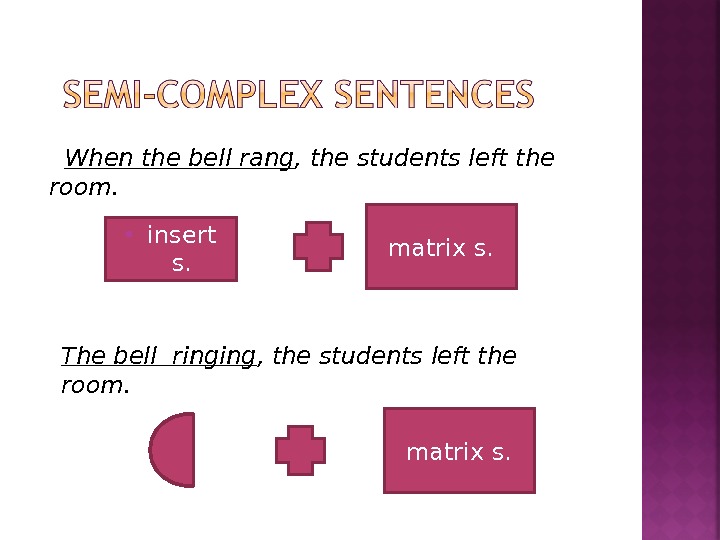

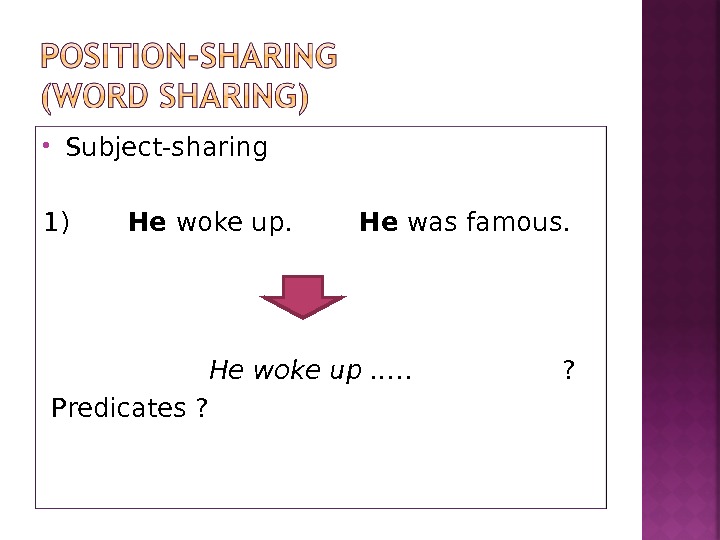


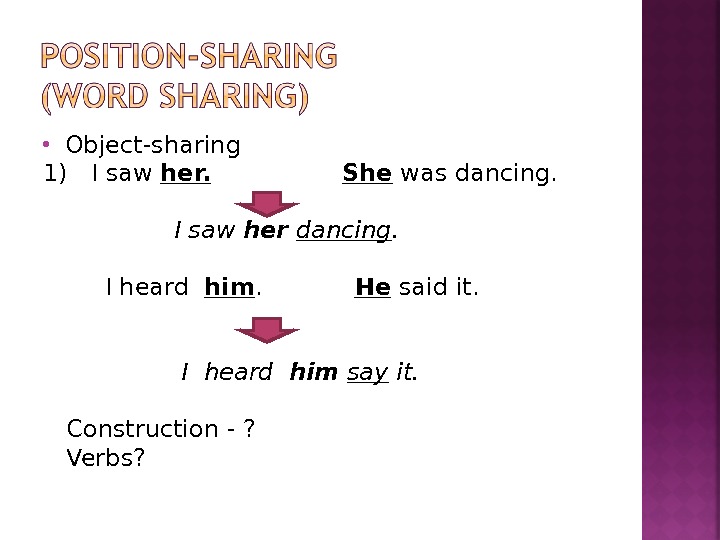
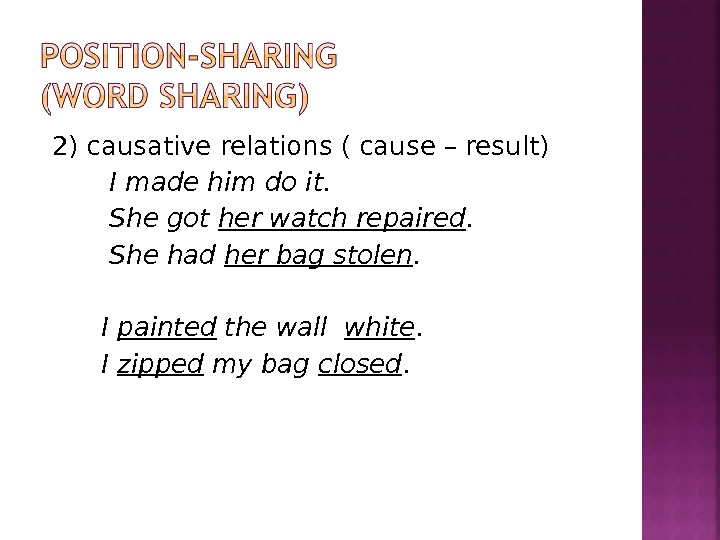
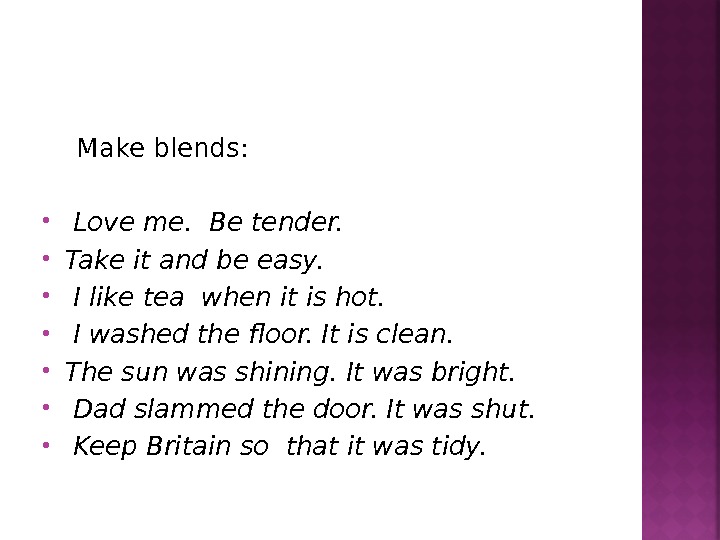


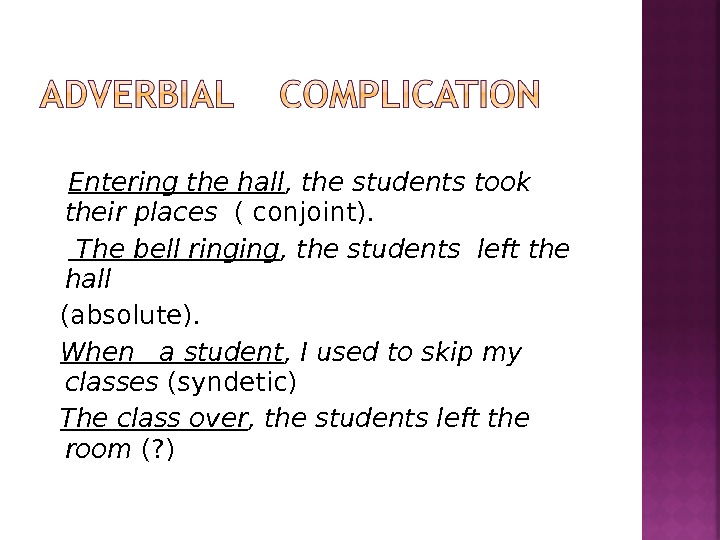
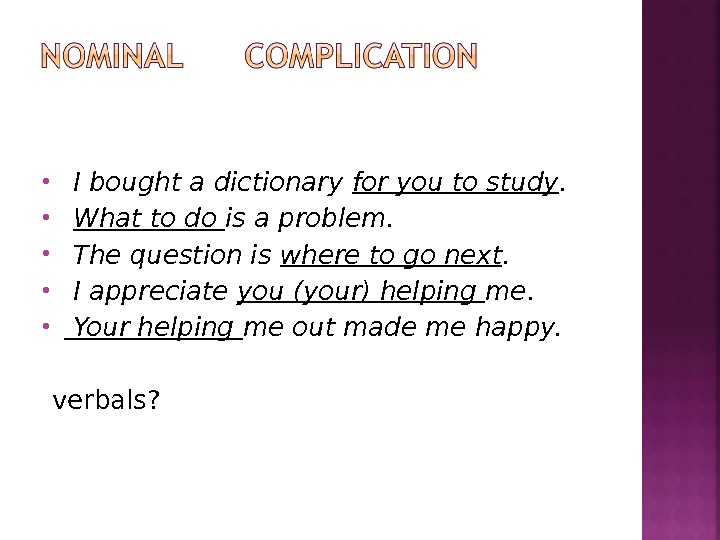
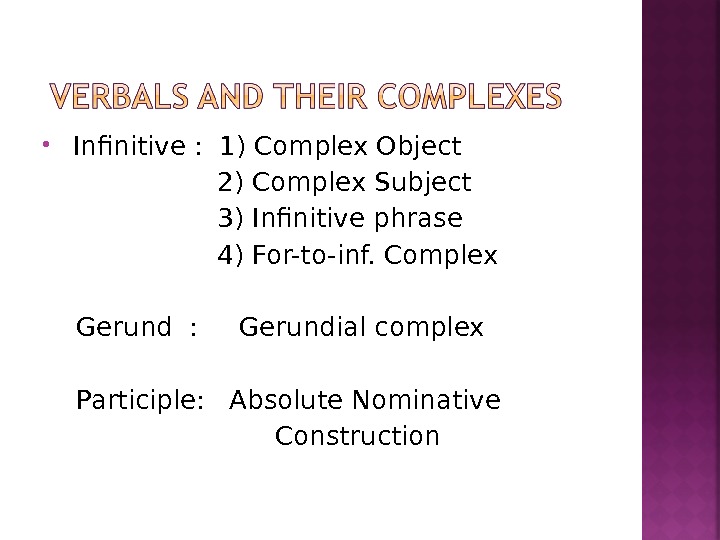
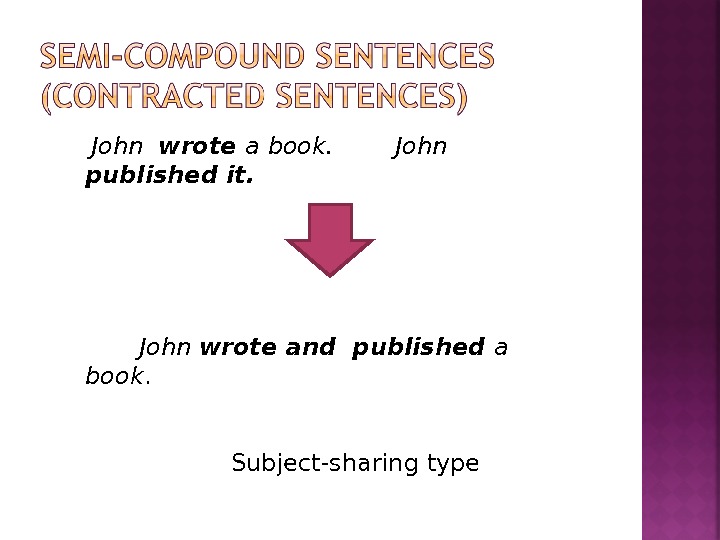
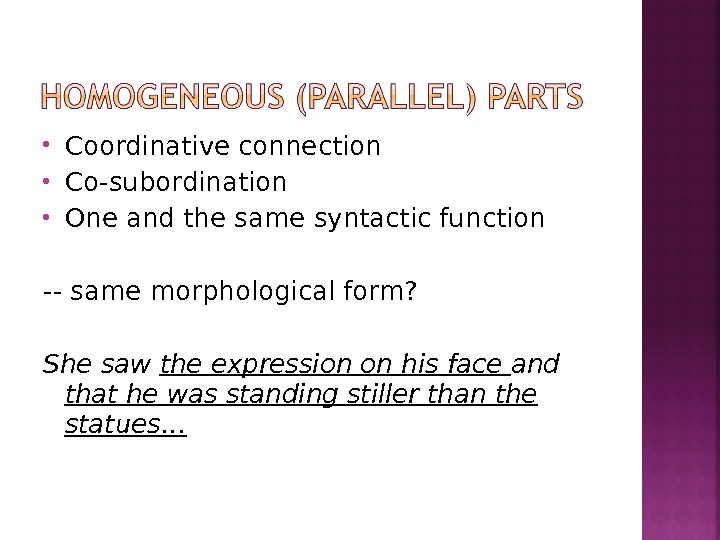
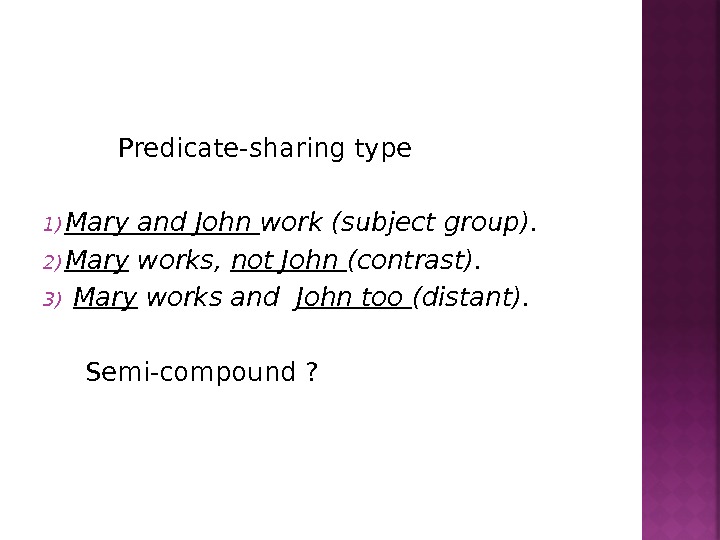
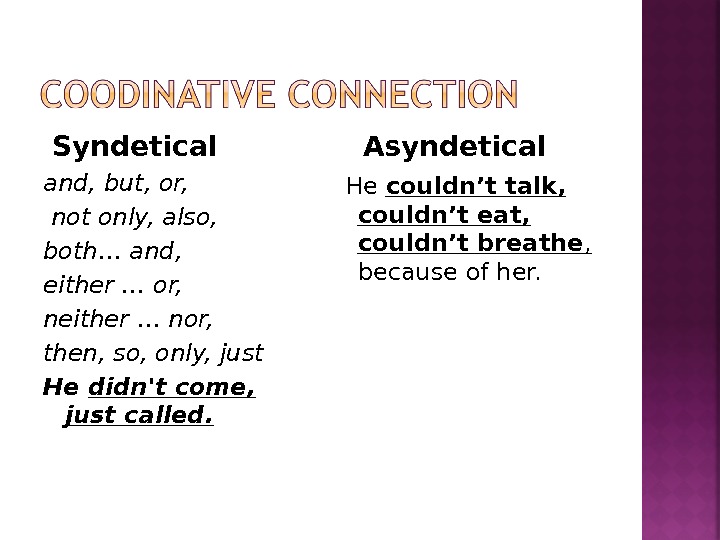
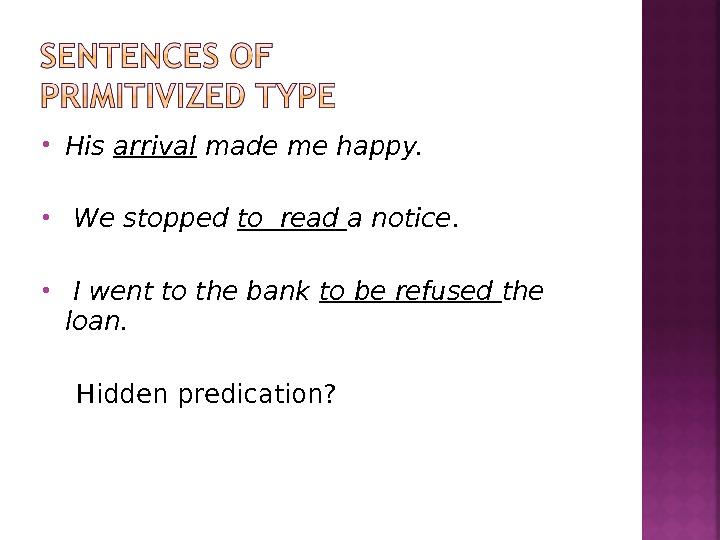
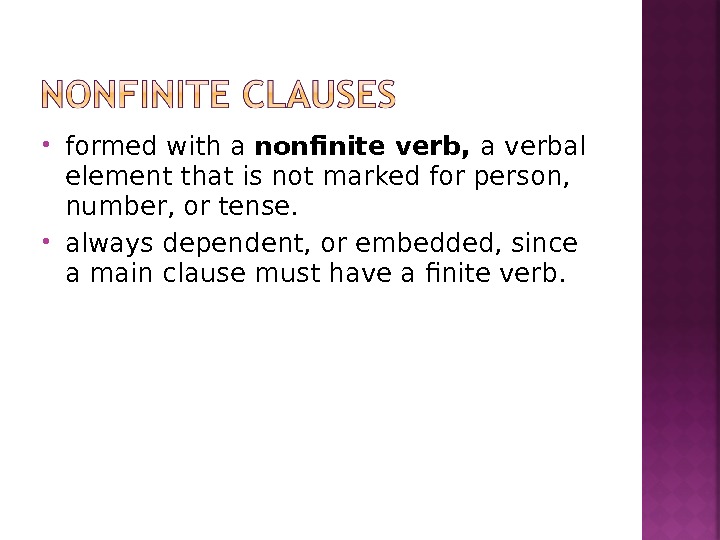
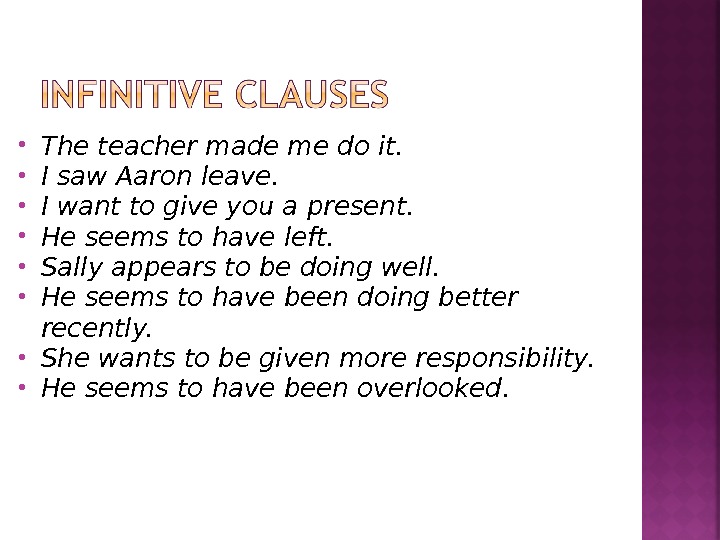
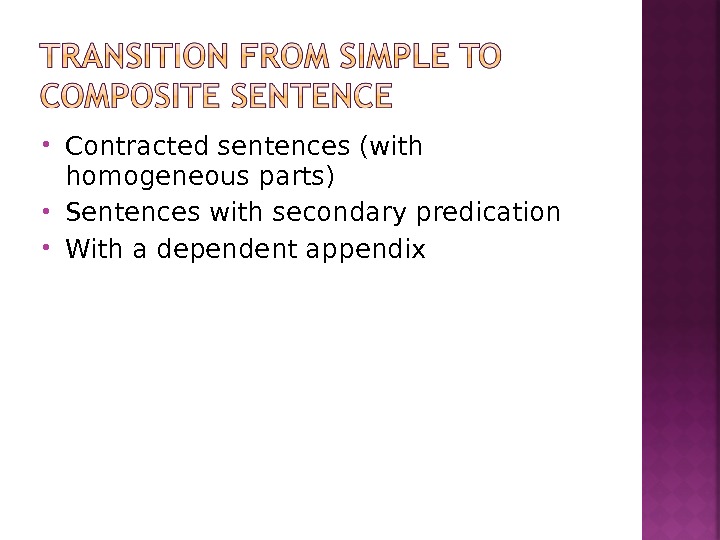
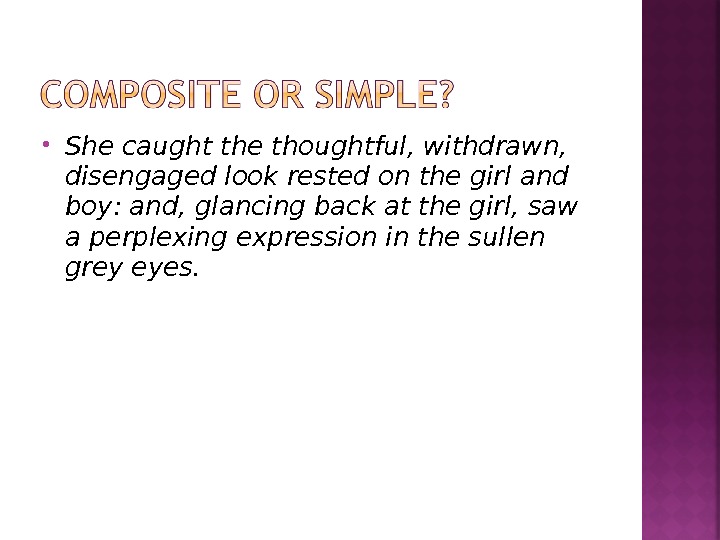
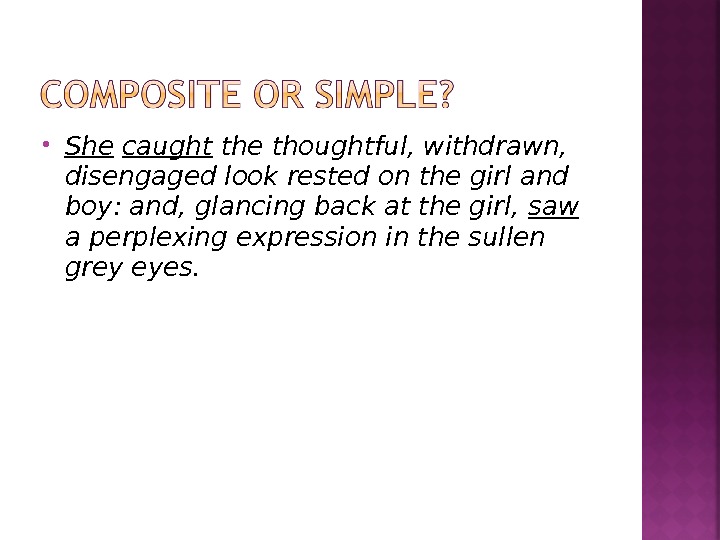
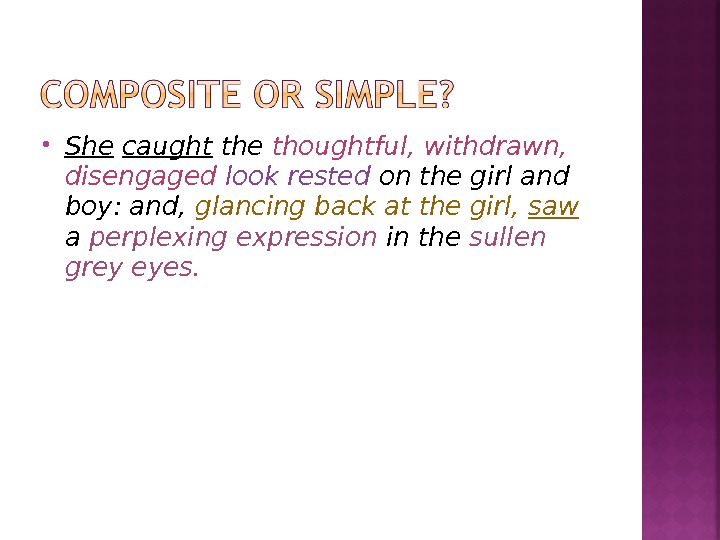
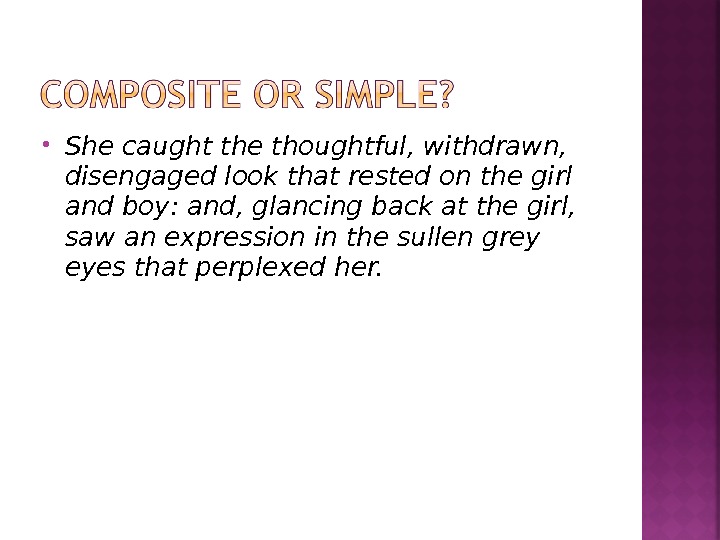
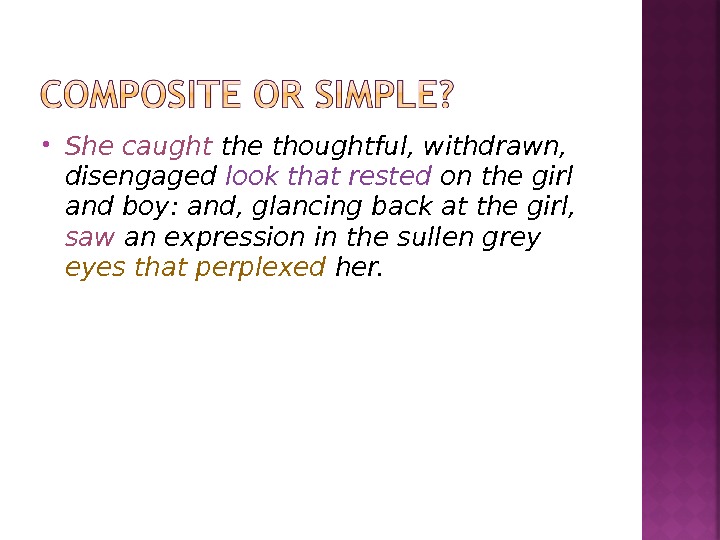

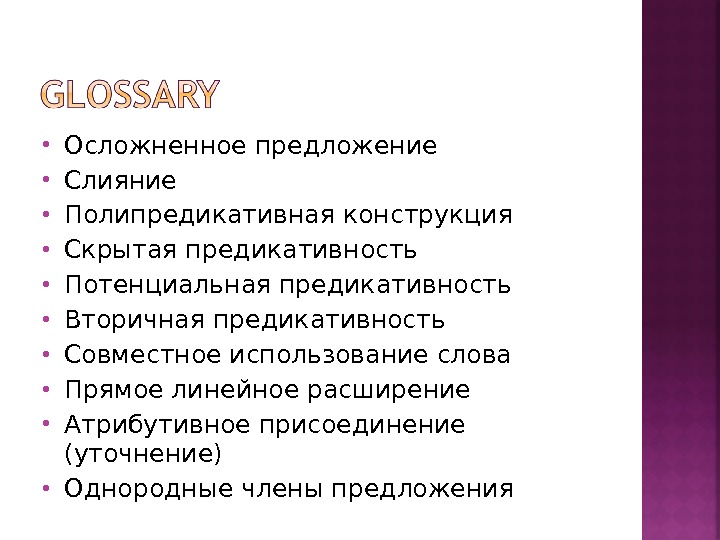
lecture_6_semi-composite_sentence.ppt
- Размер: 3.6 Mегабайта
- Количество слайдов: 36
Описание презентации 1. The fused (blended) composition of the s-c. по слайдам
 1. The fused (blended) composition of the s-c. sentence. 2. The paradigmatics of the s-c. sentence. 3. The types of s-c. sentences 4. The syntactic status of the sentences with verbals.
1. The fused (blended) composition of the s-c. sentence. 2. The paradigmatics of the s-c. sentence. 3. The types of s-c. sentences 4. The syntactic status of the sentences with verbals.
 Semi-composite sentence is a sentence that contains two types of predication: primary and secondary connected either by coordinate or subordinate relations.
Semi-composite sentence is a sentence that contains two types of predication: primary and secondary connected either by coordinate or subordinate relations.
 Semi-composite sentence is a polypredicative construction consisting of more than one predicative line which are expressed in fusion. Composite – pred. line + pred. line Semi-composite — pred. line + semi- pred. line Fusion ( blending) semi-predication (hidden predication, potential predication)
Semi-composite sentence is a polypredicative construction consisting of more than one predicative line which are expressed in fusion. Composite – pred. line + pred. line Semi-composite — pred. line + semi- pred. line Fusion ( blending) semi-predication (hidden predication, potential predication)
 1) the principle of economy 2) closer connection of the events in a sentence with a fused element. When I entered the room , I turned the radio on. Entering the room , I turned the radio on.
1) the principle of economy 2) closer connection of the events in a sentence with a fused element. When I entered the room , I turned the radio on. Entering the room , I turned the radio on.
 + leading semi-predicative (dominant) I want you to know it.
+ leading semi-predicative (dominant) I want you to know it.

 Syntactic structure : simple sentence ( one full predicative line) Semantic structure: composite sentence (two situations) intermediary status
Syntactic structure : simple sentence ( one full predicative line) Semantic structure: composite sentence (two situations) intermediary status

 insert s. matrix s. When the bell rang , the students left the room. The bell ringing , the students left the room. matrix s.
insert s. matrix s. When the bell rang , the students left the room. The bell ringing , the students left the room. matrix s.
 1. Position-sharing (word sharing) — subject-sharing — object-sharing 2. Direct linear expansion
1. Position-sharing (word sharing) — subject-sharing — object-sharing 2. Direct linear expansion
 Subject-sharing 1) He woke up. He was famous. He woke up …. . ? Predicates ?
Subject-sharing 1) He woke up. He was famous. He woke up …. . ? Predicates ?
 She grew up a beautiful woman. They married young. His was found dead. Go easy! Slim happy!
She grew up a beautiful woman. They married young. His was found dead. Go easy! Slim happy!
 Subject-sharing 2) She was seen. She was sleeping. She was seen sleeping. Construction?
Subject-sharing 2) She was seen. She was sleeping. She was seen sleeping. Construction?
 Object-sharing 1) I saw her. She was dancing. I saw her dancing. I heard him. He said it. I heard him say it. Construction — ? Verbs?
Object-sharing 1) I saw her. She was dancing. I saw her dancing. I heard him. He said it. I heard him say it. Construction — ? Verbs?
 2) causative relations ( cause – result) I made him do it. She got her watch repaired. She had her bag stolen. I painted the wall white. I zipped my bag closed.
2) causative relations ( cause – result) I made him do it. She got her watch repaired. She had her bag stolen. I painted the wall white. I zipped my bag closed.
 Make blends: Love me. Be tender. Take it and be easy. I like tea when it is hot. I washed the floor. It is clean. The sun was shining. It was bright. Dad slammed the door. It was shut. Keep Britain so that it was tidy.
Make blends: Love me. Be tender. Take it and be easy. I like tea when it is hot. I washed the floor. It is clean. The sun was shining. It was bright. Dad slammed the door. It was shut. Keep Britain so that it was tidy.
 1. attributive complication 2. adverbial complication 3. nominal complication
1. attributive complication 2. adverbial complication 3. nominal complication
 The sun, setting in the ocean, looks terrific. — Base sentences? The typed letter was sent in the morning.
The sun, setting in the ocean, looks terrific. — Base sentences? The typed letter was sent in the morning.
 Entering the hall , the students took their places ( conjoint). The bell ringing , the students left the hall (absolute). When a student , I used to skip my classes (syndetic) The class over , the students left the room (? )
Entering the hall , the students took their places ( conjoint). The bell ringing , the students left the hall (absolute). When a student , I used to skip my classes (syndetic) The class over , the students left the room (? )
 I bought a dictionary for you to study. What to do is a problem. The question is where to go next. I appreciate you (your) helping me. Your helping me out made me happy. verbals?
I bought a dictionary for you to study. What to do is a problem. The question is where to go next. I appreciate you (your) helping me. Your helping me out made me happy. verbals?
 Infinitive : 1) Complex Object 2) Complex Subject 3) Infinitive phrase 4) For-to-inf. Complex Gerund : Gerundial complex Participle: Absolute Nominative Construction
Infinitive : 1) Complex Object 2) Complex Subject 3) Infinitive phrase 4) For-to-inf. Complex Gerund : Gerundial complex Participle: Absolute Nominative Construction
 John wrote a book. John published it. John wrote and published a book. Subject-sharing type
John wrote a book. John published it. John wrote and published a book. Subject-sharing type
 Coordinative connection Co-subordination One and the same syntactic function — same morphological form? She saw the expression on his face and that he was standing stiller than the statues…
Coordinative connection Co-subordination One and the same syntactic function — same morphological form? She saw the expression on his face and that he was standing stiller than the statues…
 Predicate-sharing type 1) Mary and John work (subject group). 2) Mary works, not John (contrast). 3) Mary works and John too (distant). Semi-compound ?
Predicate-sharing type 1) Mary and John work (subject group). 2) Mary works, not John (contrast). 3) Mary works and John too (distant). Semi-compound ?
 Syndetical and, but, or, not only, also, both… and, either … or, neither … nor, then, so, only, just He didn’t come, just called. Asyndetical He couldn ’t talk, couldn’t eat, couldn’t breathe , because of her.
Syndetical and, but, or, not only, also, both… and, either … or, neither … nor, then, so, only, just He didn’t come, just called. Asyndetical He couldn ’t talk, couldn’t eat, couldn’t breathe , because of her.
 His arrival made me happy. We stopped to read a notice. I went to the bank to be refused the loan. Hidden predication?
His arrival made me happy. We stopped to read a notice. I went to the bank to be refused the loan. Hidden predication?
 formed with a nonfinite verb, a verbal element that is not marked for person, number, or tense. always dependent, or embedded, since a main clause must have a finite verb.
formed with a nonfinite verb, a verbal element that is not marked for person, number, or tense. always dependent, or embedded, since a main clause must have a finite verb.
 The teacher made me do it. I saw Aaron leave. I want to give you a present. He seems to have left. Sally appears to be doing well. He seems to have been doing better recently. She wants to be given more responsibility. He seems to have been overlooked.
The teacher made me do it. I saw Aaron leave. I want to give you a present. He seems to have left. Sally appears to be doing well. He seems to have been doing better recently. She wants to be given more responsibility. He seems to have been overlooked.
 Contracted sentences (with homogeneous parts) Sentences with secondary predication With a dependent appendix
Contracted sentences (with homogeneous parts) Sentences with secondary predication With a dependent appendix
 She caught the thoughtful, withdrawn, disengaged look rested on the girl and boy: and, glancing back at the girl, saw a perplexing expression in the sullen grey eyes.
She caught the thoughtful, withdrawn, disengaged look rested on the girl and boy: and, glancing back at the girl, saw a perplexing expression in the sullen grey eyes.
 She caught the thoughtful, withdrawn, disengaged look rested on the girl and boy: and, glancing back at the girl, saw a perplexing expression in the sullen grey eyes.
She caught the thoughtful, withdrawn, disengaged look rested on the girl and boy: and, glancing back at the girl, saw a perplexing expression in the sullen grey eyes.
 She caught the thoughtful, withdrawn, disengaged look rested on the girl and boy: and, glancing back at the girl, saw a perplexing expression in the sullen grey eyes.
She caught the thoughtful, withdrawn, disengaged look rested on the girl and boy: and, glancing back at the girl, saw a perplexing expression in the sullen grey eyes.
 She caught the thoughtful, withdrawn, disengaged look that rested on the girl and boy: and, glancing back at the girl, saw an expression in the sullen grey eyes that perplexed her.
She caught the thoughtful, withdrawn, disengaged look that rested on the girl and boy: and, glancing back at the girl, saw an expression in the sullen grey eyes that perplexed her.
 She caught the thoughtful, withdrawn, disengaged look that rested on the girl and boy: and, glancing back at the girl, saw an expression in the sullen grey eyes that perplexed her.
She caught the thoughtful, withdrawn, disengaged look that rested on the girl and boy: and, glancing back at the girl, saw an expression in the sullen grey eyes that perplexed her.
 It takes less courage to climb down than to face capture. Denis tried to escape but in vain.
It takes less courage to climb down than to face capture. Denis tried to escape but in vain.
 Осложненное предложение Слияние Полипредикативная конструкция Скрытая предикативность Потенциальная предикативность Вторичная предикативность Совместное использование слова Прямое линейное расширение Атрибутивное присоединение (уточнение) Однородные члены предложения
Осложненное предложение Слияние Полипредикативная конструкция Скрытая предикативность Потенциальная предикативность Вторичная предикативность Совместное использование слова Прямое линейное расширение Атрибутивное присоединение (уточнение) Однородные члены предложения

